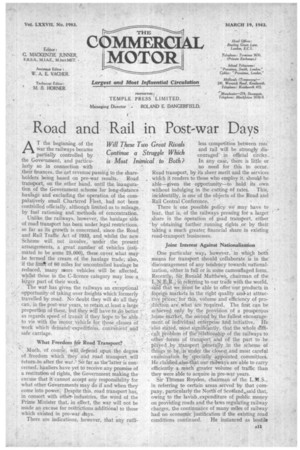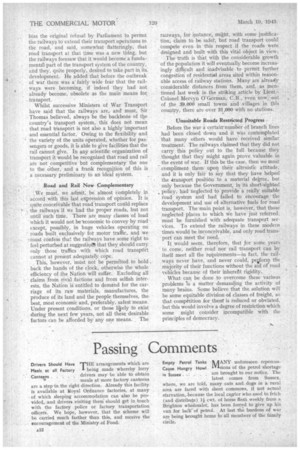Road and Rail in Post-war Days
Page 13

Page 14

If you've noticed an error in this article please click here to report it so we can fix it.
T the beginning of the war the railways became partially controlled by the Government, and particularly so in connection with their finances, the net revenue passing to the shareholders being based on pre-war results. Road transport, on the other hand, until the inauguration of the Government scheme for long-distance haulage and excluding the operation of the cornpahtively small Chartered Fleet, had not been controlled officially, although limited as to mileage. by 'fuel rationing and: methods of cencentration.
Unlike the railways, however, the haulage side of road transport has been under legal restrictions, so far as its growth is concerned, since the Road and Rail Traffic Act of 194 and whilst the new Scheme will not involve, under the present arrangements, a great number of vehicles (estimated to be some 25,000), these cover what may be termed' the cream of the haulage trade; also, if the lintft of 60 miles for uncontrolled haulage be reduced, Many more vehicles will be affected, whilst thOse in the C-licence category may lose a larger part of their work.
The war has given the railways an exceptional opportunity of taking over freights which formerly travelled by road. No doubt they will do all they can, in the post-war years, to retain at least a large proportion of these, but they will have to do better as regards speed of iranSit if they hope to he able to vie with the 'Motor vehicle for those classes Of work which demand expeditious, coriVenieht and safe carriage.
_ What Freedom fOr Road Transport?
Muth, of courS'e; will, 'depend ,upon the degree of :freedom which they and road transport will return-to after the war.',' SO far as thelatter is concerned; hauliers have yet to receive any promise of a restitution of rights, the Government making the excuse that it cannot accept any responsibility for what other Governments may do if and when they come into power. Despite this, road transport has, in consort with others industries, the word of the Prime Minister that, in effect, the war will not be made an excuse for restrictions addithinal to those which existed in pre-war clays.
There are indications, however, that any ruth less competition between ma( and rail will be strongly discouraged' in 'Official circles. In any case, there is little or no need for this to occur. Road transport, by its sheer merit and the services which it renders to those who employ it, should be able—given the opportunity—to hold its own without indulging in the cutting of rates. • This, incidentally, is one of the objects of the Road and Rail Central Conference.
There is one possible policy we may have to fear, that is, of the railways pressing for a larger share in the operation of ;bad transport, either -by obtaining further running rights or by their taking a Much greater financial share in existing road-transport businesses.
Joint Interest Against Nationalization One particular way, however, in which both means for transport should collaborate isin the 'discouragement of any tendency towards nationalization, either in full or in some camouflaged form. Recently, Sir Ronald Matthew's, chairman of the in referring to our trade with the world, 4ict that we must be able to offer our products in fbreig,n. markets in 'the right quality and. at attractive prices; for this, volume and efficiency of proAtidtion are what. are required. The first can be achieved only by. the provision of a prosperous home Market, the second by the fullest encouragement Of indiVidtia.I enterprise and initiative. He alsd stated, most signifiCantly, that the whole criffiCult problem of the relationship' of the railways to other -forms of transport and of the part to be played,..by ;transport generally in the Scheme of things to b, is under the close4, and most careful exaininaiithi by -specially apPointed committees. He clairliedalso;that our railways are able to carry efficiently a much greater volume of traffic than they were able to acquire in pre-war years. Sir Thomas Royden, chairman of the L.M.S., in referring to certain areas •served by that company, particularly the North of Scorland,,said that, owing ni the lavish.expenditure of public money on providing roads and.the laws regulating railway charges, the continuance of many miles of railway had no economic justification if the existing road conditions continued. He instanced as hostile bias the original refusal by Parliament to permit the railways to extend their transport operations to the road, and said, somewhat flatteringly, that road transport at that time was a new thing, but the railways foresaw that it would become a fundamental part of the transport system of the country, and they, quite properly, desired to take part in its development. He added that before the outbreak of war there was afairly wide fear that the railways were becoming, if indeed they had not already become, obsolete as the main means for transport.
Whilst successive Ministers of War Transport have said that the railways are, andmust, Sir Thomas believed, always be the backbone of tile country's transport system, this does not mean that road transport is not also a highly important and essential factor. Owing to the flexibility and the variety of the units operated, whether for pas: sengers or goods, it is able to give facilities that the rail cannot give. In any scientific organization of transport it would be recognized that road and rail are not .competitive but complementary the one to the other, and a frank recognition of this iS a necessary preliminary to an ideal system.
Road and Rail Now Complementary We must, we admit; be almost completely in accord with this last .expression of opinion. It is quite conceiimble that road transport could replace the railways if we had the proper roads, but not until such time. There are many classes of load -which it would not bel-conomic to convey by road except, possibly, in huge vehicles operating on roads built exclusively for motor traffic, and we Prriust confess that the railways have some right to feel perturbed at suggestiorig that they should carry only those traffics • with which road transp6rt cannot at present adequately cope.
This, however, *mist not be permi1ted to hold . back the hands of the clock, otherwise the whole efficiency of the Nation will suffer. Excluding all claims from rival factions and from selfish interests, the Nation is entitled to demand for the carriage of its raw materials, manufactures, the produce of its land and the people themselves, the. best, most economic and, preferably, safest means. Under present conditions, or those 4ely to exist during the next few years, not all these desirable factors can be afforded by any one means. The railways, forinstance; might, with some justification, claim to be. safer, but road transport could , compete even in this respect if the roads were designed and built with this vital object in view.
The truth is that with the considerable growth of the population it Will eventually become increasingly difficult and inadvisable to permit further congestion of residential areas sited within reasonable access of railway stations. Many are already considerable distances from them, and, • as mentioned last week in the striking article by Lieut.Colonel Mervyn O'Gorman, C.B.,-even now, out of the 39,000 small towns and villages in this country, there are over 31,000 with no stations.
Unsuitable Roads Restricted Progress... Before Before the war a cettain-number of branch lines had been closed -down and it Was contemplated that many others would have' received similar treatment. The railways claimed that they did not carry this policy out to the full because they thought that they might again prove valuable in the event of war. If this be the case, then we must compliment themupon their altruistic attitude, and it is only fait to say that they have helped the transport position to a material degree, but only because the Government, in its shortsighted „ policy, had neglected to provide a really suitable toad system and had failed to encourage the development and use of alternative fuels for road transport. The -main point is, however, that those neglected places to which We have just referred, must be furnished. with adequate transport services. To extend the railways in these Modern times would be inconceivable, and only road trans port can meet the need.
It would seem, therefore, that Pr some years to. come, neither road nor. rail -transport can by itself meet all the requirements—in fact, therail-. ways never have, and never could, peOorrn the majority of their functions without the aid oeroad vehicles because of their inherent rigidity.
What can be done to overcome these various problems is a matter demanding the activity of many brains. Some believe that the. solution will be some equitable division-of classes of freight, so thatcompetition for then? is reduced or obviated, but this would involve a degree of restriction-which some might consider incompatible with_ the principles of democracy.




















































